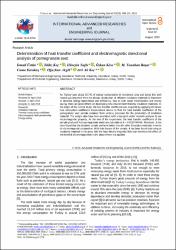Determination of heat transfer coefficient and electromagnetic directional analysis of pomegranate seed

Göster/
Tarih
2019Yazar
Üstün, İsmailKoç, Yıldız
Yağlı, Hüseyin
Köse, Özkan
Başar, Mustafa Tunahan
Karakuş, Cuma
Akgöl, Oğuzhan
Koç, Ali
Üst veri
Tüm öğe kaydını gösterKünye
Üstün, İ , Koç, Y , Yağlı, H , Köse, Ö , Başar, M , Karakuş, C , Akgöl, O , Koç, A . (2019). Determination of heat transfer coefficient and electromagnetic directional analysis of pomegranate seed . International Advanced Researches and Engineering Journal , 3 (2), 98-104. https://doi.org/10.35860/iarej.412270Özet
As Turkey uses about 25.7% of energy consumption in residential area and doing this with natural gas imported from the abroad, production of efficient insolation materials is important to decrease energy dependence and deficiency. Due to both waste minimisation and money saving, there are great efforts on developing new environment friendly insulation materials. In the scope of the current study, the heat transfer coefficient was acquired by applying the linear heat conduction coefficient measurement device to find the heat transfer coefficient of the pomegranate seed sample obtained from various processes for the production of insolation material. The sample also have been examined with a two-port vector network analyser to see electromagnetic property. At the end of the experiment, the heat transfer coefficient of the sample produced from pomegranate seeds was calculate as k = 0.6115 W/mK. Moreover, it has been found that the obtained sample performs better than the other insulation materials in terms of electromagnetic perspective. With this feature of the sample, it has been found that using as insolation material in the areas with the high electro-magnetic field can minimize the effect of the harmful electromagnetism in the place where it is applied.
Kaynak
International Advanced Researches and Engineering JournalCilt
3Sayı
2Bağlantı
https://doi.org/10.35860/iarej.412270https://dergipark.org.tr/tr/download/article-file/772680
https://hdl.handle.net/20.500.12508/1607















